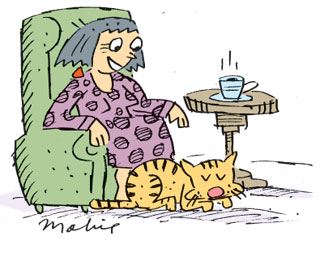|

by R. S. Karunaratne
How to use 'at,
in, to'
As a general rule 'at' and 'in' are used to show position. 'To' shows
direction or movement.
I'll meet you at the entrance.
|

The cat is lying at my feet. |
Everything seems difficult at the beginning.
She usually sits at the long table.
Who is standing at the top of the stairs?
The cat is lying at my feet.
There is someone at the gate.
We spent the whole day at a cricket match.
Please give me your number at home.
Did you enjoy your three years at university?
Don't disturb him, he is at lunch.
In
Put the books back in the cupboard.
Marie is still in bed.
On the Independence Day most of us got stuck in a traffic jam.
Her parents lived in an old walauwa.
How much is that doll displayed in the window.
Old people usually get a pain in their back.
What's in your hand? Show it to me.
Doctor, I've got something in my ear.
Do you still work in the Maldives?
Why are you always looking at yourself in the mirror?
The principal is in hospital.
Is your son still in school?
(Does he still go to school?)
When 'to' is used before a verb, it is in the infinitive.
The employees want to strike.
Hungry people desire to eat.
Intelligent students like to study.
Nobody wants to die.
Ask him to come.
We use 'to' after some nouns.
We have the ability to defeat terrorism.
You have the capacity to do this job.
|

Put the books back in the cupboard. |
She had the audacity to call me a liar.
He had the courtesy to send her a 'Thank you' card.
She never got an opportunity to meet the director.
'To' + an infinitive is used to introduce a clause.
To be honest, I didn't see your wallet.
To be quite truthful with you, I don't like the Smiths.
We use 'to' to show direction.
I was on my way to Colombo when the accident happened.
Siva went to India last month.
I received another invitation to a wedding.
Foreign words
used in English
English has borrowed many words from
foreign languages such as Latin and French. Here is a list of such words
frequently used in English.
1. The Government has appointed an ad hoc commission to inquire into
the FTZ (Free Trade Zone) incidents. (L: particular purpose)
2. She does not want to go on working there ad infinitum. (L: for
ever)
3. The actor was well-known for his ad lib performances. (L:
spontaneous)
4. She sang the same song ad nauseam. (L: to an excessive or
unacceptable extent)
5. Shall we order an a la carte menu? (F: as separate items from a
menu)
6. Peiris is Sam's alter ago - they go everywhere together. (L: a
close friend)
7. Please do not offend his amour propre.
(F: one's own sense of dignity)
8. Sita had only just got up and she wasn't yet fully compos mentis.
(L: having full control of her mind)
9. All his plans to expand business have entered a cul-de-sac. (F:He
cannot make any programme)
10. Though her premiership was challenged, she continued to rule de
facto. (L: in actual fact)
11. She had an old sense of deja vu just as she entered the old
house. (F: sense of familiarity)
12. Smart casual is de rigueur at the cocktail party. (F: required by
social custom.
13. The couple's intimate conversation made him feel distinctly de
trop. (F: not wanted or not welcome)
14. The author of the novel was the son of an Iranian emigre's.
(F: person who has left his country for political reasons)
15. There are reports of estate workers protesting en bloc over the
wage issue. (F: all together)
16. Naslima's advanced ideas have made her the enfant terrible of the
literary world. (F: somebody who shocks or embarrasses the
establishment)
17. Individually, workers are a disciplined lot. However, en masse
they can be truthless. (F: in a crowd)
18. The principal mentioned en passant that he was leaving the
country. (F: briefly)
19. We stopped at Chennai en route from London to Sri Lanka. (F: on
the way)
20. His enormous wealth and popularity gave him an entree into
upper-class circles. (F: means of admission)
21. We cannot change the world. Ergo, we must change ourselves! (L:
therefore)
22. The book carries a list of errata. (L: errors)
23. The police have filed charges against Simon et al. (L: and other)
24. The longest serving employee of the company was given an ex
gratia payment. (L: as a favour)
25. The chairman was present at the meeting ex officio. (L: because
of his position)
******
Key:
L: Latin F: French
******
Starters :
More
on present continuous
tense
The present continuous tense is used for an action happening now.
It is raining.
I am not wearing a tie as the heat is unbearable.
Why are you reading my diary?
A: What is he doing?
|

Flowers smell sweet. |
B: He is building a sand castle.
Nethmi is not coming today.
We use the present continuous tense for an action happening about
this time but not necessarily at the moment.
She is reading Shakespeare's Macbeth.
I am teaching English and learning French.
Father is working as a private detective.
Nobody knows what she is doing.
Lalith is building a house.
When the same person is doing two activities at the same time the
second auxiliary verb can be dropped.
Mala is knitting and watching TV.
Sarath is eating a mango and listening to the radio.
NOTE:
The two verbs are usually joined by 'and'.
We use the present continuous tense for a definite arrangement in the
near future.
I am meeting Amara tonight.
A: Are you going any where tomorrow?
B: Yes, I am visiting Francis.
We use the present continuous tense with 'always', mostly to show
annoyance.
He is always shouting at me.
Bobby is always losing his pen.
Nethra is always going on leave.
You're always making silly mistakes.
The present continuous tense is used for an action which appears to
be continuing.
Lalani is always thinking.
Mervyn is always reading.
We do not use certain verbs in the present continuous tense. They are
of three types.
1. Verbs of the senses or voluntary actions.
Feel, hear, see, smell, notice, observe, look taste
How do you Feel ?
I hear music.
Flowers smell sweet.
Do you notice how many students are absent?
Let's observe sil on Poya day.
This sari looks nice.
The soup tastes horrible!
If we deliberately use the senses, such verbs can be used in the
present continuous tense.
Look! Somebody is watching you.
Why is he gazing at her?
I am listening to classical music.
Why are you looking at me?
We are observing your behaviour.
The tourist is staring at the image.
2. We normally do not use verbs expressing feelings and emotions in
the present continuous tense.
We admire the beauty of paintings
I adore you
They appreciate your work.
What do you desire ?
I detest laziness.
"I hate you", she said.
We like to live happily.
Do you love me?
A: Can I use your ruler?
B: I don't mind.
Respect your parents and teachers.
What do you want?
I wish you a happy birthday!
3. We usually do not use verbs of mental activity in the present
continuous tense.
I agree with what you say.
We appreciate your kindness.
When do you wish to assume duties?
I don't believe it.
Other verbs of mental activity: expect, feel, forget, know, mean,
perceive, realise, recall, recognise, recollect, remember, trust,
suppose. |

